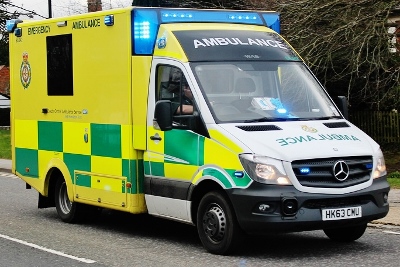Ambulance service turns to Poland to recruit paramedics
On 03/06/2015 At 6:30 pm
Category : Missed a ThameNews story?, More News, Thame news
Responses : No Comments
FOUR people from Poland have recently become the first cohort of qualified paramedics from that country to begin working for South Central Ambulance Service (SCAS) NHS Foundation Trust.
All UK ambulance services are currently experiencing a shortage of qualified paramedics and despite wide-spread advertising including within its own workforce of support staff, following extensive research by the Trust, SCAS decided to focus initially on Poland. Sharon Walters, Director of Human Resources and Organisational Development at SCAS said:
“We were looking at a number of countries and our criteria included the fact that there needed to be access to BSc qualified paramedics whose clinical practice virtually mirrored that of a UK paramedic. Having narrowed these countries down to a small handful we felt Poland would be the most suitable to visit first in terms of meeting our criteria.”
 Although also considered by other UK trusts, SCAS is the first such organisation to set up a formal recruitment process in Poland in partnership with an internationally recognised recruitment company. Earlier this year, a small team from SCAS comprising experienced recruitment and education staff and a number of experienced SCAS paramedics who originated from Poland, visited Warsaw to conduct an initial assessment centre with over 30 attendees that had been pre-selected by SCAS’ in-country recruitment partner.
Although also considered by other UK trusts, SCAS is the first such organisation to set up a formal recruitment process in Poland in partnership with an internationally recognised recruitment company. Earlier this year, a small team from SCAS comprising experienced recruitment and education staff and a number of experienced SCAS paramedics who originated from Poland, visited Warsaw to conduct an initial assessment centre with over 30 attendees that had been pre-selected by SCAS’ in-country recruitment partner.
“The ‘Polish paramedics’ who came on the trip were invaluable”, continued Sharon. “They were able to provide us with guidance around qualifications, working practices and culture. It was also a bit of an eye-opener for our HR and education team to discover what it’s like to be an operational frontline paramedic in Poland, including having to hold a BSc and work in excess of 300 hours a month!”
During the initial assessment, attendees had to undertake a driving test, a clinical scenario and a full interview in addition to the normal background checks held for any potential SCAS employee. The tests employed were identical to those carried out in the UK and candidates whose English language was not of a high enough standard for work within the UK were rejected, irrespective of the quality of their clinical experience.
Whilst there is of course costs associated with recruitment from abroad in this way, the Trust believes that in the long-term, the return on investment of such a trip more than outweighs the cost of not having enough clinically qualified staff. Recruiting such staff ensures that more frontline ambulances are covered by qualified paramedics rather than having those vehicles, or shifts, sitting uncovered or the Trust having to utilise private providers to meet demand.
“To put the cost versus value arguments in some sort of context”, explained Sharon, “if only one of the recruited paramedics remains working for SCAS for 12 months, this would more than cover the cost of three recruitment trips.”
The initial recruitment drive in Poland identified 15 suitable paramedics and the initial cohort of four are currently in the UK and undertaking a six-week familiarisation training programme at the Trust’s Nursling Ambulance Station in Southampton. A further 11 qualified paramedics from Poland are due to arrive to start a second familiarisation course in June. The Trust is also approached by overseas candidates directly and an Australian paramedic has joined the four Poles currently training at Nursling and a further six international candidates will join the second cohort.
The six-week course covers everything clinically required according to both SCAS and Joint Royal Colleges Ambulance Liaison Committee (JRCALC) protocols thereby allowing the international staff to initially practice at student paramedic level until they have gained their Health and Care Professions Council (HCPC) registration. Once this is achieved, they become fully operational paramedics.
SCAS has said that it will continue to support its own staff to develop their careers as paramedics, but with the HCPC working towards the role of a UK paramedic becoming an all graduate profession, but as this takes time, the international recruitment drive will remain important for the Trust for the next few years.
And what do the candidates themselves think about coming to work for SCAS?
“Our training is really important for us and is going really well. We’re really enjoying it; it’s really appreciated and it’s a chance to see how you work. The third manning shifts have been going really well and we would like to thank staff for being so welcoming, supporting us in our move and answering any questions we have. The main difference we have found is that the equipment that you have is a lot more advanced than that of the equipment we have in Poland or Australia,” they said.
SOURCE: Press Release


